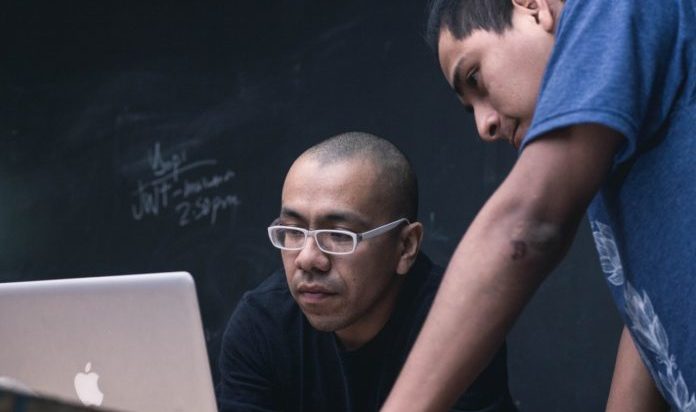3 Things You Learn When You Teach

By Eric Scott
I never set out to be a boot camp instructor. I had been working in the ed tech industry for seven years, had helped mentor interns, and even had assisted a few friends going through boot camps themselves. Then one day my HVAC broke, and that same week I got a message on LinkedIn asking if I’d be interested in teaching part-time in the evening. I thought to myself, “It’s only six months, and I need the money, what have I got to lose?” Fast forward two and a half years and I’m now teaching full-time. And to be honest it’s the most rewarding job I’ve ever had. I’ve gotten the chance to impact so many different students, I’m always on my toes, and I’ve been able to grow a lot in soft and technical skills. With my experience I thought I’d share three topics I’ve had the chance to learn a lot more about along the way.
-
Engagement
The more students pay attention in class the better. As an instructor, I have to not only be engaging to my students but also create engagement with the material itself. When you’ve created an environment for students to discuss code with each other, they are engaged. When they are working on their homework and finally have that “aha” moment, they are engaged. Should you do your best to be personally engaging? Of course. But that’s not the be-all and end-all.
So what are some ways to actually create engagement? A good way to start is by simply asking questions. Filling in a form? Ask the class. Choosing colors in the CSS? Ask a student. All the little issues that cause bikeshedding arguments are amazing fodder for engagement, because it’s easy for the students to have an opinion. Continue to use what they give you. If you discover that your students enjoy film, then throw in references to those same movies that they keep talking about. Have students commiserate together about the homework. Have them discuss code together. Encourage them to meet up outside of class.
Give students a way to engage that isn’t verbal. This will help especially with shy or introverted students. When we have students code a version of Rock Paper Scissors I have them play the game together, and we cheer for the winners. If time allows I even try to organize a quick tournament.
-
Encouragement
Google conducted a study on what makes teams successful, and one of the top factors is psychological safety—or more plainly “Can I take risks without feeling insecure or embarrassed?”
Learning is frustrating and involves a lot of failing. It is very important to create an environment where failure is not only acceptable but expected. I stress this point early and often.
“This will feel frustrating.” “This is hard.” “This is different from anything we’ve done before.”
Validating the struggle is not always easy. There are days where I come home frustrated and ask myself “Why don’t they get it?” Sometimes it’s because I made mistakes, and I have to have the humility to accept that. More often, though, I am reminding myself out loud, “They are new to this, and I’m not. They are not the students I taught last cohort.”
As important as establishing the conditions for optimal learning is your treatment of the learners. Praise students early and often. Recognize them for good questions. Show off particularly good versions of homework. And have the students themselves affirm their peers. After projects I have students approach each other and say, “Your project was really cool! How did you do….” and have them fill in the blank. Creating that safe environment is vital. This doesn’t mean that teams won’t have arguments or heated discussions; they will. But in a welcoming learning space, these discussions are a reflection of the students’ curiosity, not an indictment of character or ability.
-
Boundaries
Boot camps are stressful. If you are engaging and encouraging to the class, students are going to ask for help. These requests are wonderful; helping people is one of my primary reasons for teaching. However, it’s easy for some students to become overly reliant on the instructional staff. Dependent students end up not developing their own skills or independent confidence. Good boundaries and expectations help prevent this.
One simple boundary is establishing a cutoff time for messaging students. Pick a time in the day after which you are unavailable and then communicate that time to students clearly and repeatedly. Emphasize how much you are free and available the rest of the time.
Another important boundary is homework. I won’t be available at midnight to help students troubleshoot a deploy issue. I strongly encourage students to try and have homework done the day before so that we can address any issues they are having in class or during office hours. This mirrors the same discipline that we try to employ in our professional lives to avoid those late-night deployments to production, with “Please God” as the commit message.
Establish boundaries, communicate them early and often, and offer as much help as you can inside those boundaries. This is important not only for you but also for your TAs, who are taking their cue from you.
I’ve learned a lot about engagement, encouragement, and boundaries as an instructor in boot camps, but I’ve learned so much more from my students. Teaching is a deeply fulfilling part of my life. So why not give it a shot? At the most practical level, it’s six months of your time, and you might need the money. At its most transcendental, it might turn into the best job you’ve ever had.

 Live Chat
Live Chat